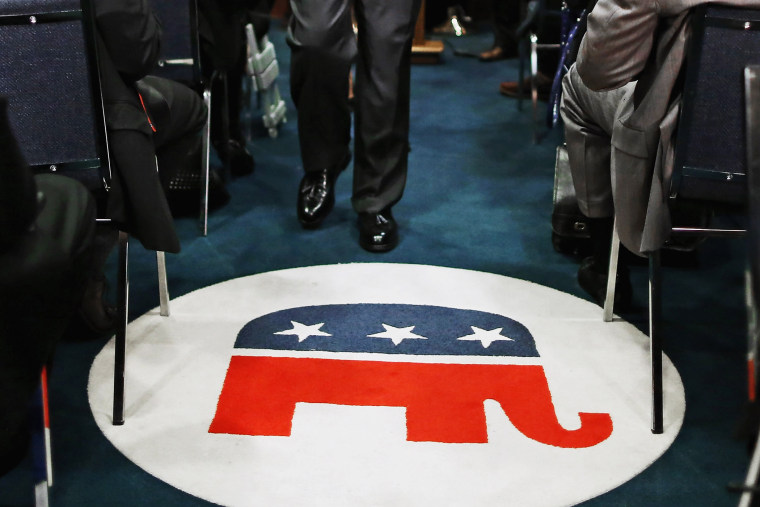The day after Super Tuesday, when Donald Trump's position as the Republican frontrunner became more obvious, The Atlantic published a piece with an interesting quote from GOP admaker Rick Wilson.
"A generation of work with African Americans -- slow, patient work -- I can't tell you how great it is that we've pissed that away because of Donald Trump in one day," Wilson complained.
The frustration was understandable, but the analysis was hardly compelling. To think that the Republican Party has been making steady progress towards winning over African-American voters -- following a "generation of work," no less -- is at odds with much of what we know about race and party politics in contemporary America.
As his party's presidential nominee, Trump would obviously exacerbate the GOP's problems with minority communities, but the notion that Republicans were otherwise on the verge of some kind of breakthrough is incorrect.
A few days later, Politico published a related piece making the case that Trump has effectively killed the Republican National Committee's post-2012 "autopsy" report: "Republican elders drew up a blueprint for a kinder, more inclusive Republican party. Trump is tearing it apart."
Reeling from a second straight loss to Barack Obama, a flailing Republican Party in 2013 found its culprit: Mitt Romney's callous tone toward minorities. Instead of being doomed to irrelevance in a changing America, the party would rebrand as a kinder, more inclusive GOP. They called their findings an "autopsy," and party leaders from Paul Ryan to Newt Gingrich welcomed it with fanfare. But even then, Donald Trump was lurking.... The billionaire has not only ignored the report's conclusions, he has run a campaign that moved the party in the exact opposite direction.
The Washington Post published a similar article yesterday, following the collapse of Marco Rubio's failed presidential campaign. The demise of the senator's candidacy, the Post noted, marked the point at which "years of carefully laid plans to repackage the Republican Party's traditional ideas for a fast-changing country came crashing down."
The RNC's 2013 "autopsy," the article added, offered a map for the party to "regain the presidency." Now the party appears to be throwing it all away.
The problem with the analysis is similar to the trouble with Rick Wilson's complaints about Trump and race to The Atlantic: it's overly focused on recent events and fails to appreciate the developments of the last several years.
It's an inconvenient truth, but the RNC's "autopsy" didn't suffer a fatal blow at Trump's hands on Super Tuesday, and it didn't die when Rubio quit in Miami on Tuesday night. The report and its blueprint were killed years ago by Republican officials themselves -- long before a certain New York land developer decided to run for president.
The "autopsy" encouraged congressional Republicans to pass comprehensive immigration reform, but the party's lawmakers refused. The report urged party officials to moderate their position on gay rights and the culture war, but Republicans ignored the suggestion. The document said Republicans must be willing to start reaching out beyond just conservative media organizations to get the party's message out, and officials and candidates did the opposite.
RNC Chairman Reince Priebus unveiled the "autopsy" on March 18, 2013 -- exactly three years ago tomorrow -- with the hopes that policymakers throughout the party would take its findings seriously. It quickly became apparent, however, that Republican officials, especially on Capitol Hill, considered the conclusions useless. It was, for all intents and purposes, dead on arrival.
On March 18, 2014, I published an overview on the "autopsy" and Republicans' willingness to implement its suggestions in the year following its unveiling, and at the time, the only changes the party was willing to make was to the mechanics of its presidential nominating process -- changes, ironically, the party now regrets.
Yes, the "autopsy" is dead, and Republicans are taking a risk by ignoring its advice. But let's not pretend its demise is a recent development. Republicans killed the report years ago.
